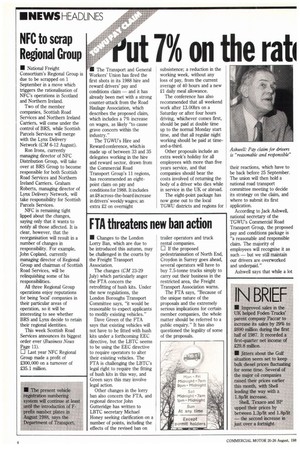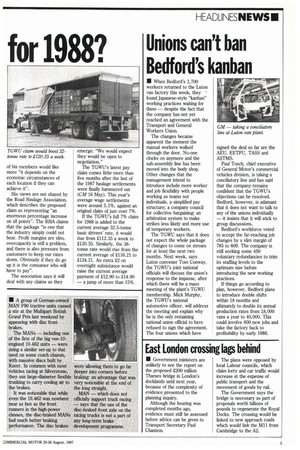ut 7% on the rab
Page 6

Page 7

If you've noticed an error in this article please click here to report it so we can fix it.
for 1988?
The Transport and General Workers' Union has fired the first shots in its 1988 hire and reward drivers' pay and conditions claim — and it has already been met with a strong counter-attack from the Road Haulage Association, which describes the proposed claim, which includes a 7% increase on wages, as likely "to cause grave concern within the industry."
The TGWU's Hire and Reward conference, which is made up of between 33 and 35 delegates working in the hire and reward sector, drawn from the Commercial Road Transport Group's 11 regions, has recommended an eightpoint claim on pay and conditions for 1988. It includes an 28 across-the-board increase in drivers' weekly wages; an extra 22 on overnight subsistence; a reduction in the working week, without any loss of pay, from the current average of 40 hours and a new 21 daily meal allowance.
The conference has also recommended that all weekend work after 13.00hrs on a Saturday or after four hours driving, whichever comes first, should be paid at double time up to the normal Monday start time, and that all regular night working should be paid at timeand-a-third.
Other proposals include an extra week's holiday for all employees with more than five years service, and that companies should bear the costs involved of returning the body of a driver who dies while in service in the UK or abroad.
The eight-point package has now gone out to the local TGWU districts and regions for their reactions, which have to be back before 25 September. The union will then hold a national road transport committee meeting to decide its strategy on the claim, and where to submit its first application.
According to Jack Ashwell, national secretary of the TGWU's Commercial Road Transport Group, the proposed pay and conditions package is "a reasonable and responsible claim. The majority of employees will recognise it as such — but we still maintain our drivers are overworked and underpaid."
Ashwell says that while a lot of his members would hire more "it depends on the economic circumstances of each location if they can achieve it".
His views are not shared by the Road Haulage Association, which describes the proposed claim as representing "an enormous percentage increase on all points". The RHA claims that the package "is one that the industry simply could not bear. Profit margins are slim, overcapacity is still a problem, and there is also pressure from customers to keep our rates down. Obviously if they do go up it is the consumer who will have to pay".
The association says it will deal with any claims as they emerge: "We would expect they would be open to negotiation."
The TGWU's latest pay claim comes little more than five months after the last of the 1987 haulage settlements were finally hammered out (CM 16 May). This year's average wage settlements were around 5.1%, against an original claim of just over 7%.
If the TGWU's full 7% claim for 1988 is added to the current average 32.5-tonne basic drivers' rate, it would rise from £112.35 a week to £120.35. Similarly, the 38tonne rate would rise from the current average of £116.21 to £124.21. An extra 22 on overnight subsistance would raise the current average payment of £12.90 to £14.90 — a jump of more than 15%.




















































































